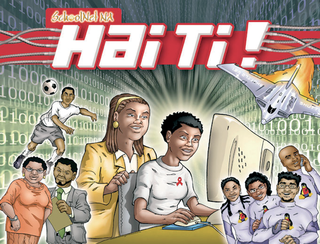
By Patricia Jung
The not-for-profit group SchoolNet Namibia [1] learned the hard way that narrowing the digital divide is not done simply by providing schools in developing countries with computers running open source software and some basic training. When trainers left the schools after the two-month training period, most of the computers collected dust, mainly because the teachers - mostly women - would not use them. To remedy the situation, SchoolNet Namibia, in cooperation with the comic artists of Strika Entertainment [2], The Namibian newspaper [3], and the Johannesburg-based South African Linux distributor OpenLab International [4], launched "Hai Ti!", a comic strip that recently turned two years old. The comic strip title means "Listen up!" in the Namibian language Oshiwambo.
The first, 20-page-thick comic strip was distributed with The Namibian`s weekly "Youth-Paper" in April 2005, and 20,000 additional copies went directly to schools across the country. So far, four issues have been produced and distributed as an insert in The Namibian. Issues are also available online [5, 6].
OpenLab includes the first three issues in its EduKar educational software suite [7] for primary and secondary schools and homeschooling, as shown in Figure 1. The OpenLab/EduKar community recently expanded to Europe, where the German Linux Users Group Norderstedt [8] installed it at a local school in the spring of 2007.
The "Hai Ti!" comics are licensed under a generic Creative Commons Attribution--Noncommercial license, quite likely as the first of its kind. The comic strip stories draw from everyday life in a rural school, show how the protagonists use open source software and the Internet to solve problems, and promote the Creative Commons idea.
Alongside the storyboard, readers find glossary entries (Figure 2) and practical hints, such as "Save and view photos with KView or GIMP, both in Go > Graphics," promoting the OpenLab distribution and EduKar.
Parts of the comics include detailed screenshots that show how to use a certain open source software. In Issue 2, for example, there is a detailed description of how to set up the accounting for an Internet café using the Internet café management suite DireqCafe (Figure 3). (The software's successor, ZybaCafe [9], hadn't been released when Issue 2 came out.) Issue 4 provides more details about using GIMP.
Throughout the comics, the reader learns about interesting software, such as the genealogy program Gramps [10], the TappyTux [11] game suite for children (originally developed for SchoolNet Namibia), and interesting net resources like Merlot.org, a portal for educational content by teachers for teachers [12].
The main characters - HIV-positive student Helvi at Dangungu High School and her teacher Ms Katoma, who is responsible for the school's computer lab - are both female, and their supporting team at SchoolNet is gender-balanced (although the male characters are the more technical ones). In this respect, "Hai Ti!" is very much about digital self-empowerment of women.
Whereas Issue 1 outlines the problem of orphaned computer labs and shows how this situation can be overcome to the benefit of everyone involved with the institution, Issue 2 features a bad guy who rips off schoolmasters by selling them overpriced and non-working hardware equipment.
Issue 3 of the series describes Helvi coming out as HIV positive, and Issue 4 not only reunites a family but also lobbies for solar power and discusses the bad environmental effects of burning firewood.
Super-human qualities are contributed by the four SchoolNet characters, and there is also room for an innocent little romance between Helvi and the school's great soccer (and later, GIMP) talent, Imanu.
Readers might appreciate the progressive and socially responsible entertainment that this professionally drawn series provides. Be prepared, however, to see what else "Hai Ti!" offers - well-crafted promotion for SchoolNet and OpenLab.
The nature of educational comic strips is to draw sharp contrasts between the author's conception of good and bad, so don't expect any criticism about the usefulness of GIMP or other open source tools. In the end, "Hai Ti!" doesn't address the technical reasons why those computer labs might have been abandoned by the teachers in the first place, including any usability flaws with open source software. Perhaps this will be a topic for a later issue.
| INFO |
|
[1] SchoolNet Namibia: http://www.schoolnet.na/
[2] Strika Entertainments: http://www.strika.com/ [3] The Namibian: http://www.namibian.com.na/ [4] OpenLab International: http://getopenlab.com/ [5] "Hai Ti!" online: http://www.schoolnet.na/haiti/ [6] Get OpenLab gallery: http://www.getopenlab.com/gallery/main.php [7] EduKar: http://getopenlab.com/olmambo/content/view/1113/50/ [8] German Blog about the deployment of OpenLab/EduKar: http://openlabingermany.wordpress.com/ [9] ZybaCafe: http://silentcoder.co.za/silentcoder/content/view/67/53/ [10] Gramps: http://www.gramps-project.org/ [11] TappyTux: http://silentcoder.co.za/silentcoder/content/view/12/40/ [12] Merlot.org: http://www.merlot.org/merlot/index.htm |